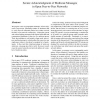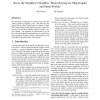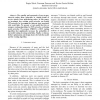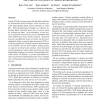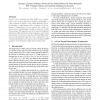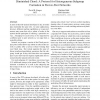110
Voted
IPTPS
2004
Springer
15 years 7 months ago
2004
Springer
We propose a new cryptographic technique, Acknowledgment Compression, permitting senders of multicast data to verify that all interested parties have either received the data or l...
126
click to vote
IPTPS
2004
Springer
15 years 7 months ago
2004
Springer
We investigate an approach for routing in p2p networks called neighbor-of-neighbor greedy. We show that this approach may reduce significantly the number of hops used, when routi...
114
click to vote
IPTPS
2004
Springer
15 years 7 months ago
2004
Springer
Structured peer-to-peer (p2p) overlay networks provide a decentralized, self-organizing substrate for distributed applicad support powerful abstractions such as distributed hash t...
102
click to vote
IPTPS
2004
Springer
15 years 7 months ago
2004
Springer
— The equality and anonymity of peer-to-peer networks makes them vulnerable to routing denial of service attacks from misbehaving nodes. In this paper, we investigate how existin...
115
click to vote
IPTPS
2004
Springer
15 years 7 months ago
2004
Springer
Popular P2P file-sharing systems like Gnutella and Kazaa use unstructured network designs. These networks typically adopt flooding-based search techniques to locate files. Whil...
153
click to vote
IPTPS
2004
Springer
15 years 7 months ago
2004
Springer
— Peer-to-peer computing, the harnessing of idle compute cycles throughout the Internet, offers exciting new research challenges in the converging domains of networking and distr...
104
click to vote
IPTPS
2004
Springer
15 years 7 months ago
2004
Springer
— Mutual exclusion is one of the well-studied fundamental primitives in distributed systems. However, the emerging P2P systems bring forward several challenges that can’t be co...
112
click to vote
IPTPS
2004
Springer
15 years 7 months ago
2004
Springer
A protocol for a distributed hash table (DHT) incurs communication costs to keep up with churn—changes in membership—in order to maintain its ability to route lookups efficie...
IPTPS
2004
Springer
15 years 7 months ago
2004
Springer
IPTPS
2004
Springer
15 years 7 months ago
2004
Springer
In most of the P2P systems developed so far, all nodes play essentially the same role. In some applications, however, different machine capabilities or owner preferences may mean ...
